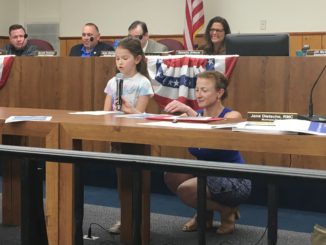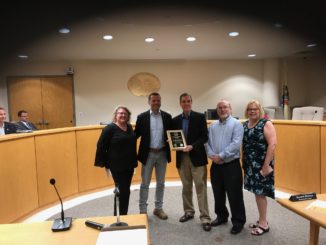
[slideshow_deploy id=’899′]
ENGLEWOOD, N.J.—Over the last six months, Englewood has paid approximately $10,000 monthly to recycle the materials collected in its single-stream collection system, which mixes paper, cardboard, aluminum and glass in a single container, according to a Department of Public Works sanitation supervisor and recycling coordinator.
DPW Supervisor Raymond Romney told the council Oct. 23 that the city is paying Atlantic Coast Fibers, Passaic, approximately $10,000 to accept and recycle the city’s monthly collection of single-stream recyclables. The single-stream collection system started over three years ago, said Romney, noting it was started to save money by reducing labor costs for collection.
Romney said up until April, Atlantic Coast Fibers paid the city about $3,000 monthly for approximately 270 tons of recyclables. However, once markets dried up for recyclables, including China’s new restrictions on contaminants in recycled products, Englewood has been paying to dispose of recyclables.
Romney said via phone Oct. 24 that though the city still saves money on labor costs of a single-stream system, he hopes to clean up the city’s recycling stream and generate future revenues.
In 2017: $36K in revenue
Romney said the city was paid about $36,000 in recyclable revenue in 2017 and had not previously paid out money to dispose of recyclables. Although he called the switch to single-stream recycling a “win-win for Englewood” in cost savings, he said he’s been looking at alternatives to bring back more revenue to the city for recyclables.
It was not clear how much Atlantic Coast Fibers was paying Englewood to accept its previous dual-stream recyclables collection, when separate collections were made for paper/cardboard and aluminum/plastics and glass.
Some communities switched to single-stream recycling when recycling companies were paying more for single-stream recycled materials but market conditions—and revenues—for such commodities have dramatically fallen and many communities are now paying to dispose of recyclable materials.
Making matters worse, Romney and environmental commission member Chelsea Gleis reported that some city residents continue to throw items into the single-stream containers, especially plastics that its recycling company does not accept, which contaminates the collected recyclables.
Reducing the bill
Romney said he hoped to reduce the city’s monthly recycling bill, and he said one way for residents to help would be to prevent certain plastics from being thrown into the recycling container. He said the DPW sent out postcards to every city household specifying what plastics are acceptable and not acceptable for recycling.
These include plastic items listed with the numbers 3, 4, 6 and 7. Items that should not be included in recycling bins include plastic wrap, PVC shower curtains, food trays, bubble wrap, plastic shopping bags, bread bags, garbage bags, styrofoam, packing peanuts, CD cases, plastic utensils, fiberglass, compact discs, DVDs, and potentially hazardous items including aerosol cans, automotive additives, and dried paint, states a flyer prepared by the DPW.
“Basically we’re just trying to bring revenues back to the city. It’s not just an Englewood problem,” said Romney, noting disappearing markets for recyclables have hurt the value of recycled products nationwide.
Environmental Commission member Chelsea Gleis said “everyone has this issue. We’re just asking residents to keep the plastic bags separate from the recyclables.”
She said currently a bill pending in the state Senate would ban plastic bags, styrofoam and straws statewide.
‘A great wake-up call’
Gleis said the shake-up in recyclable prices and problems with plastic bags are “a great wake-up call for people all over the country…this is an opportunity for people to think more about what they’re using. I think this is a moment where recycling isn’t the only answer to deal with these materials,” she said.
While Romney noted he was not in favor of a single-stream system “it saved the city money so there was not much opposition to going single-stream.” He said he realized it would be much more difficult to get residents to go back to separating all recyclables once the city switched to a single-stream collection.
“I was one that did not want to go toward single-stream,” said Romney. “Single-stream saved the city money but at the end of the day it should be all about the environment.”
Romney said with markets down for recycled materials, he would do whatever possible to improve the city’s recycling stream and bring back revenues for its recyclables.
‘If they switch back’
Fred Petrone, a municipal accounts manager with Atlantic Coast Fiber, who handles Englewood’s recyclables account, said there were many more markets for “low-grade [recycled] materials” such as contaminated and mixed recyclables several years ago.
He said now with many markets gone, recycling companies have to dispose of such materials in a landfill, which costs money.
He said “generally, towns may be able to generate revenues if they switch back to dual-stream collection” or separate collection of recyclables such as paper and glass/aluminum from single-stream collection.
‘Cost-driver is collection’
“But for municipalities the biggest cost-driver is collection of the recyclables, such as drivers, salaries, benefits, vehicles, maintenance, etc.,” said Petrone.
“If Englewood cleaned it [recyclable stream] up a little bit, the charge may go down a little bit,” suggested Petrone, when told of the city’s effort to exclude certain non-recyclable plastics.
Petrone said the recyclable prices may fluctuate widely as demand increases or decreases in national or international markets. “If new markets develop or there is sudden demand for a certain type of recyclable product, the commodity price will increase,” he noted.
Council President Wayne Hamer and Councilwoman Katharine Glynn both said more education of residents must occur on what should and should not be recycled.
‘When in doubt, throw it out?’
Glynn suggested recycling information should also be disseminated in Spanish. Glynn said she had concerns about a slogan on DPW’s information materials, which said “When in doubt…throw it out.” The line refers to the specific numbers on plastics not recyclable, including plastic numbers 3, 4, 6 and 7, plus plastic bags and styrofoam.
She said that slogan went against what most people learned about recycling and appeared to give folks not interested in recycling an easy out to not recycle.
When City Manager Ed Hynes noted that DPW recycling workers were educating residents where possible of new recycling rules, he also said he learned of another community that left the recycling bins unemptied in front of homes until residents complied with recycling rules.
“We need to educate first, the punitive stuff in the cold turkey fashion isn’t going to serve anybody,” said Hamer.
Romney said Oct. 24 he was working to have the updated recycling information on acceptable plastics posted on the city website after a Northern Valley Press reporter told him incorrect information was listed there.
For information on the city’s new recycling rules, call (201) 568-3401, extension 402.


